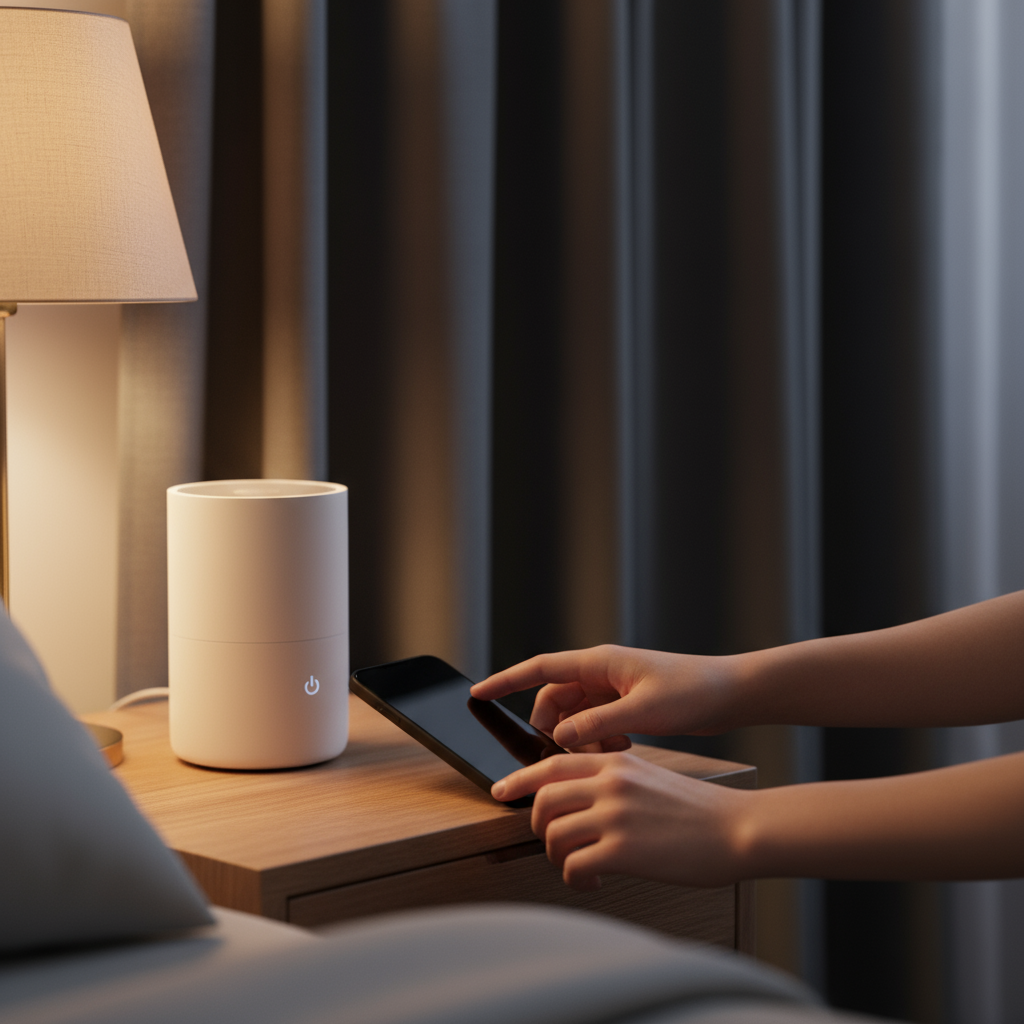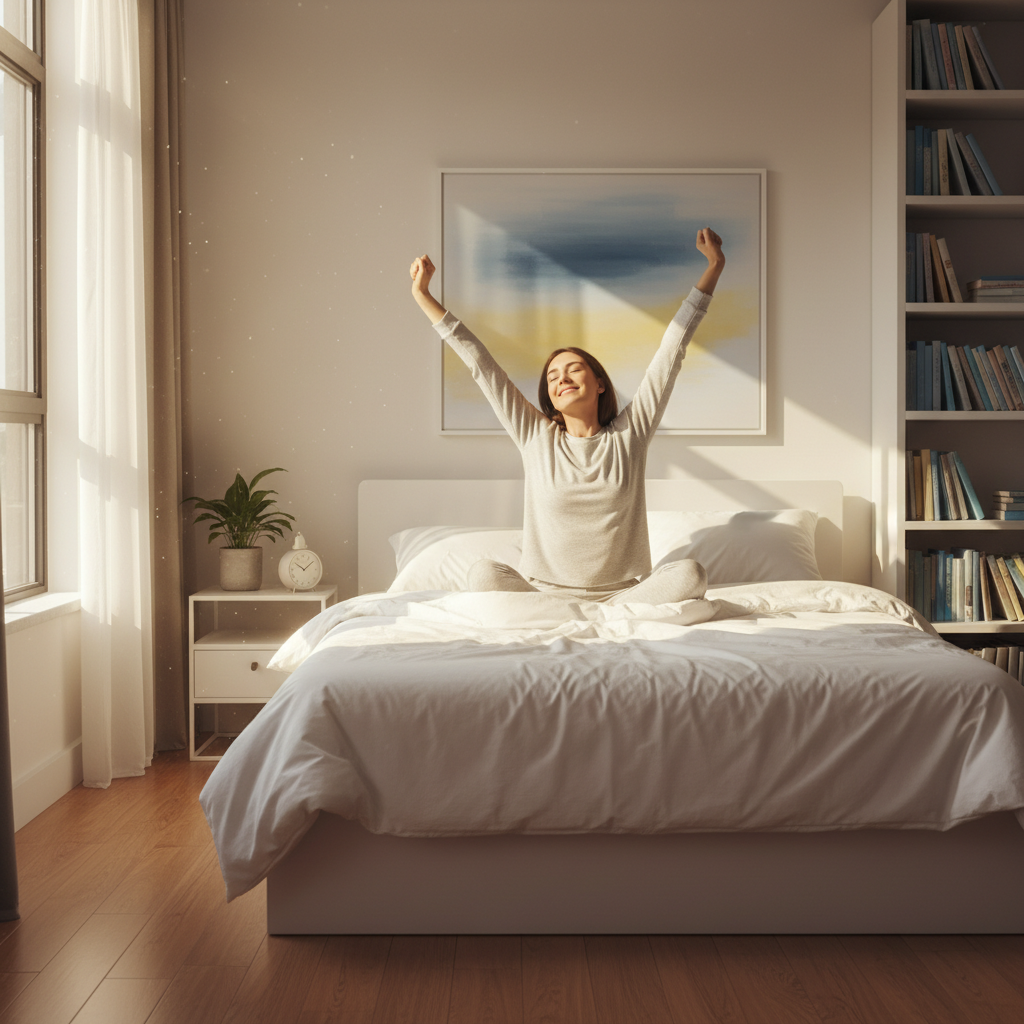
Table of Contents
Introduction
Ever lie awake at 2 AM staring at the ceiling, wondering why sleep feels like such an impossible task? You’re definitely not alone in this struggle. Millions of people toss and turn every night, and honestly, it’s exhausting. The thing is, getting quality sleep isn’t just about feeling rested—it affects literally everything. Your mood, your focus, even how you handle that annoying coworker on Monday morning.
So what exactly is sleep hygiene? Think of it as your sleep toolkit—all the habits and environmental tweaks that help you drift off peacefully and stay asleep. And here’s why it matters so much: when your sleep hygiene is off, everything else follows suit. You know that foggy feeling after a bad night’s sleep? That’s your brain and body telling you something needs to change. Recent studies show nearly 30% of adults deal with insomnia symptoms, which tells us this isn’t just a “you” problem—it’s an epidemic. Whether you’re stressed out from work or can’t stop scrolling your phone before bed, the good news is that better sleep is totally achievable. But first, let’s get you up to speed on how to improve sleep hygiene effectively so you’re starting from the right place.
Now, let’s talk about one of the biggest sleep killers out there: screen time. You’ve probably heard this before, but bear with me because it’s worth repeating. Those phones, tablets, and laptops we’re glued to? They’re pumping out blue light that basically tricks your brain into thinking it’s still daytime. Your melatonin production (that’s your natural sleep hormone) gets completely thrown off. The fix? Learning to reduce screen time strategically can be a game-changer for your sleep quality. Pair that with some solid healthy sleep habits—like actually sticking to a bedtime and creating a wind-down routine—and you’re already miles ahead of where you started.
Here’s something interesting: your sleep hygiene doesn’t exist in a bubble. Everything connects. Take exercise, for example. When you move your body regularly, you’re not just getting fitter—you’re actually setting yourself up for better sleep. Physical activity helps dial down anxiety, lifts your mood, and keeps your internal clock running smoothly. It’s like a natural sleep aid that comes with bonus benefits. If you want the full picture on why this works so well, check out the benefits of regular physical activity. And let’s be real—stress and anxiety are huge sleep disruptors. When your mind is racing, your body follows suit. That’s why understanding mental health awareness isn’t just nice to know—it’s essential for getting the rest you deserve.
What You’ll Learn in This Guide
We’re going to walk through everything you need to know to transform your nights (and your days). Here’s what’s coming up:
- Understanding Sleep Hygiene: We’ll break down what sleep hygiene actually means and why these habits and environmental factors make such a huge difference in how well you sleep.
- Identifying Disruptors: Learn about the usual suspects—screen time, stress, lifestyle choices—that mess with your sleep, plus practical ways to deal with them.
- Creating a Sleep-Friendly Routine: Step-by-step guidance on building a consistent bedtime, crafting a relaxing pre-sleep routine, and turning your bedroom into a sleep sanctuary.
- When to Seek Help: How to recognize when your sleep issues might need professional attention and what your options look like.
By the time you’re done reading, you’ll have a clear action plan you can start using tonight. Want to dive even deeper? The guide on getting better sleep pairs perfectly with what we’re covering here.
Here’s the truth: there’s no magic sleep formula that works for everyone. Your perfect sleep routine might look completely different from your best friend’s, and that’s okay. The key is understanding what works for your unique situation and building from there. The strategies we’ll cover are backed by solid research, but more importantly, they’re practical things you can actually stick with. You’ll learn how to manage stress better, create healthy boundaries with technology, and build routines that actually support your body’s natural sleep patterns.
Think of this as your chance to take a holistic approach to better health. When you improve your sleep, everything else gets easier. Your energy levels stabilize, your mood improves, and you might even find yourself more productive during the day. Whether you’re juggling a demanding career, raising kids, or just trying to feel more like yourself again, mastering sleep hygiene is one of the best investments you can make in your overall well-being.
Ready to stop counting sheep and start sleeping like you mean it? Let’s get into the nitty-gritty of sleep hygiene and build some habits that will actually stick. Your future well-rested self is going to thank you for this.

Good sleep isn’t just nice to have—it’s absolutely essential for your health and well-being. But here’s the thing: getting quality sleep often feels like solving a puzzle. You know you need it, but figuring out what’s actually keeping you awake? That’s where things get tricky. We’re going to walk through the common roadblocks to great sleep and give you practical ways to create habits and spaces that actually work for rest. The good news? You don’t need a complete life overhaul. Small tweaks in your routine can make a huge difference. Let’s dig into how your daily habits, your bedroom setup, and even your stress levels are all connected to how well you sleep—and more importantly, what you can do about it.
Common Factors Affecting Sleep Hygiene
So what’s really keeping you up at night? The answer might surprise you. It’s usually not just one thing—it’s a combination of lifestyle choices, environmental issues, and psychological factors that mess with your natural sleep rhythm. Most of us are doing things that sabotage our sleep without even realizing it. Think about it: how many times have you scrolled through your phone “just for a minute” before bed? Or stressed about tomorrow’s meeting while trying to fall asleep? Managing stress plays a huge role in preventing those middle-of-the-night wake-ups, and you can find some solid strategies in this guide on stress reduction methods. Work stress is particularly notorious for stealing sleep—something that’s covered really well in how to manage stress at work. The connection between mental health and sleep? It’s stronger than most people think.
Your bedroom environment is another major player. A room that’s too bright, noisy, or stuffy can turn what should be peaceful sleep into a restless night of tossing and turning. These might seem like small details, but they add up fast. Then there are the lifestyle habits we’ve all been guilty of: staying up late scrolling, having that extra cup of coffee, or eating a heavy meal right before bed. Take screen time, for example—the blue light from devices is basically telling your brain “stay awake!” when you want it to wind down. There’s some great practical advice on this in how to reduce screen time, which shows you how to create evening routines that actually help you sleep better.
Key Aspects of Common Sleep Disruptions
Let’s break down the main culprits that might be sabotaging your sleep. Once you know what you’re dealing with, you can start tackling these issues one by one.
- Lifestyle Habits Impacting Sleep: Irregular bedtimes, late-night snacking, alcohol, and screen time before bed—sound familiar? These habits might feel harmless, but they’re actually working against your body’s natural sleep signals. The key is building routines that support sleep instead of fighting it. Check out how to improve sleep hygiene for specific strategies that really work.
- Sleep Environment Factors: Your bedroom should be your sleep sanctuary, but if it’s noisy, bright, or uncomfortable, it’s working against you. Simple fixes like blackout curtains or a white noise machine can be game-changers. You’ll find more environmental tips in healthy sleep habits that show you how to create the perfect sleep space.
- Psychological Influences: Racing thoughts, anxiety, and stress are sleep’s biggest enemies. When your mind won’t quiet down, neither will your body. The good news is that managing stress can dramatically improve your sleep quality. Resources like mental health awareness facts and stress management techniques offer strategies for calming both your mind and body before bed.
- Technology and Screen Time: Here’s something that might shock you—the blue light from your phone or laptop is basically caffeine for your brain. It suppresses melatonin (your natural sleep hormone) and keeps you wired when you should be winding down. Managing your evening screen time is crucial, and how to reduce screen time has practical strategies for breaking the bedtime scrolling habit.
When you start addressing these sleep disruptors, you’re building a foundation for better rest that supports both your physical and mental health. It’s not about perfection—it’s about progress. Understanding these factors is the first step toward creating sleep habits that actually stick.
Practical Tips to Improve Sleep Hygiene
Ready to transform your sleep? Building better sleep habits goes way beyond just hitting the pillow earlier (though that helps too). We’re talking about creating a whole routine that signals to your body: “It’s time to rest.” This means consistent schedules, calming pre-sleep activities, and turning your bedroom into a sleep haven. You can dive deeper into actionable strategies with healthy sleep habits and how to get better sleep—both are packed with expert-backed tips for overcoming the most common sleep challenges.
Here’s the truth: improving your sleep hygiene takes commitment and some mindful tweaking of your daily choices. Your body has an internal clock, and when you work with it instead of against it, everything gets easier. But let’s be real—changing habits isn’t always simple when life gets busy. That’s where staying motivated and managing your time effectively come in handy. Resources like how to stay motivated and how to manage time effectively can help you build sustainable routines that improve both the quality and duration of your sleep.
Key Aspects of Effective Sleep Improvement
Building better sleep habits comes down to consistency and creating the right environment. Here are the strategies that actually make a difference:
- Establish a Consistent Sleep Schedule: Your body loves predictability. Going to bed and waking up at the same time every day (yes, even on weekends) helps regulate your internal clock. This makes falling asleep easier and waking up less painful. It’s one of the most effective changes you can make, and how to improve sleep hygiene explains exactly why this works so well.
- Create a Relaxing Bedtime Routine: Think of this as your transition time—a signal to your brain that sleep is coming. Reading, meditation, gentle stretching, or even a warm bath can work wonders. Just avoid anything stimulating like intense exercise or work emails. The stress reduction techniques in stress reduction methods can help you find the perfect wind-down activities.
- Optimize Your Sleep Environment: Your bedroom should be cool, dark, and quiet—think of it as a sleep cave. Blackout curtains, a white noise machine, or even just a fan can make all the difference. Small changes to your environment can have a huge impact, and healthy sleep habits has specific recommendations for creating the ideal sleep space.
- Limit Exposure to Screens and Blue Light Before Bed: This one’s tough in our screen-obsessed world, but it’s crucial. Try to power down devices at least an hour before bed. Your melatonin production will thank you. The strategies in how to reduce screen time can help you break the bedtime scrolling habit for good.

Here’s the thing about sleep hygiene—it’s not just some wellness buzzword. It’s actually your ticket to feeling human again. We’ve covered a lot of ground here, from those sneaky habits that mess with your sleep (hello, late-night phone scrolling) to the environmental factors that can turn your bedroom into a sleep disaster zone. You know what I’m talking about: the streetlight streaming through your curtains, your partner’s snoring, or that racing mind that kicks into high gear the second your head hits the pillow.
But here’s what gets me excited—we’ve also shared some real solutions that actually work. Setting a consistent bedtime? Game-changer. Creating that wind-down routine that signals to your brain “hey, it’s time to chill”? Pure magic. And don’t get me started on how much difference a dark, cool, quiet room can make. (Seriously, blackout curtains might be the best investment you’ll ever make.) The key is building these habits gradually. Your sleep won’t transform overnight (pun intended), but stick with it, and you’ll start noticing the difference in your energy, mood, and focus.
Ready to take this further? You’ve got some incredible resources at your fingertips. Start with our comprehensive guide on healthy sleep habits—it’s packed with actionable tips you can start using tonight. Since stress and anxiety are major sleep killers, check out our detailed breakdown of effective stress reduction methods. And let’s be real—if you can’t manage your time effectively, good luck maintaining a consistent sleep schedule. That’s where our guide on how to manage time effectively comes in handy. Need help staying motivated when the going gets tough? We’ve got you covered with proven strategies on how to stay motivated. Plus, understanding the broader effects of stress on the body will show you exactly why managing stress matters so much for quality sleep.
You’ve got everything you need now. Better sleep isn’t just about getting more rest—it’s about showing up as your best self every single day. Your body will thank you, your mind will be sharper, and you’ll actually have the energy to tackle whatever life throws your way. So start small, stay consistent, and be patient with yourself. Those restful nights? They’re closer than you think.
Frequently Asked Questions
-
What is sleep hygiene?
- Sleep hygiene refers to the habits and practices that promote good quality sleep.
-
How can I improve my sleep environment?
- By reducing noise, controlling light, and maintaining a comfortable temperature.
-
What are signs of poor sleep hygiene?
- Difficulty falling asleep, frequent waking, and daytime fatigue are common signs.
-
When should I see a doctor about sleep issues?
- If sleep problems persist despite improving habits, it is advisable to seek professional advice.
